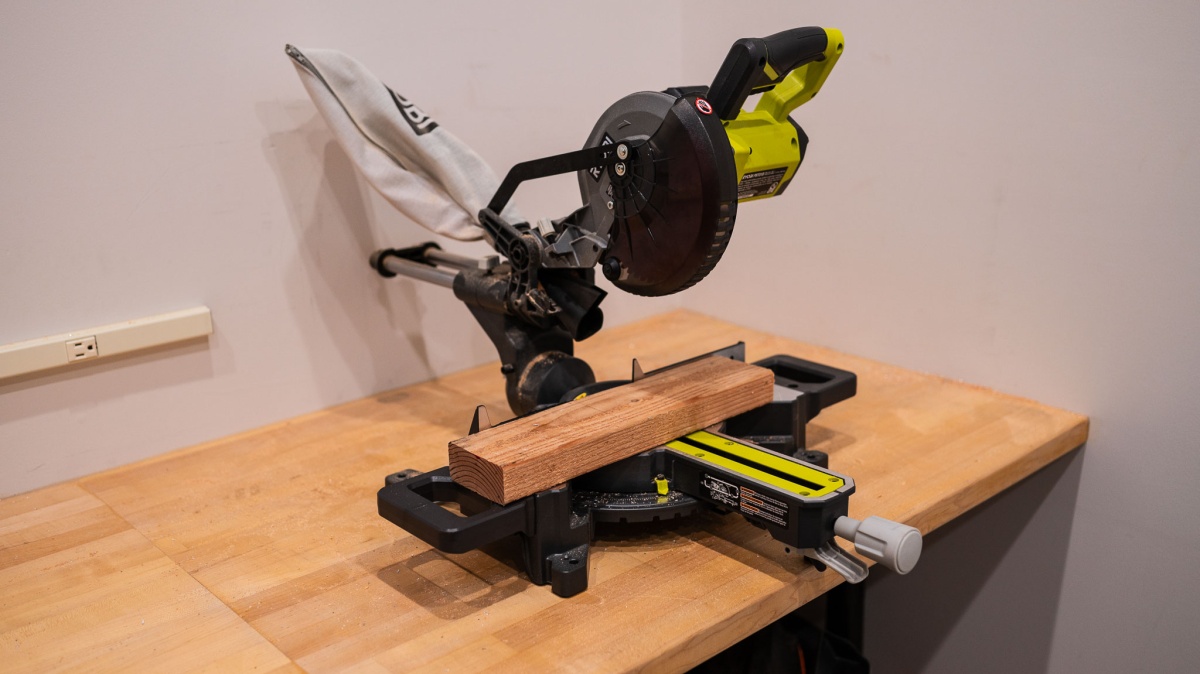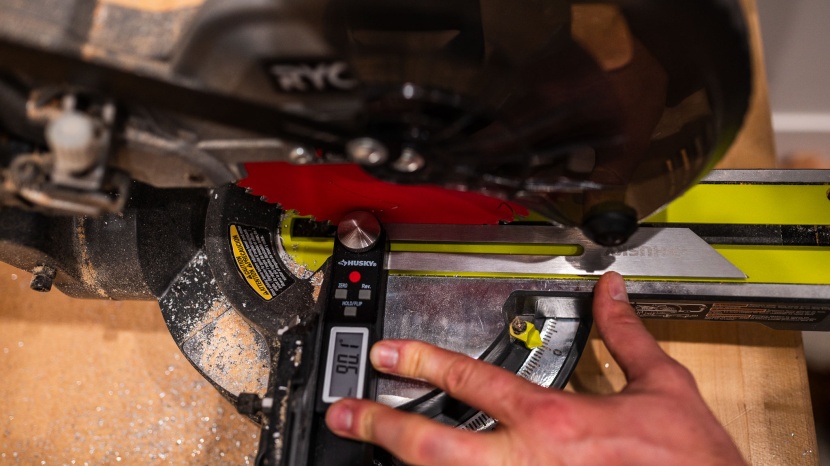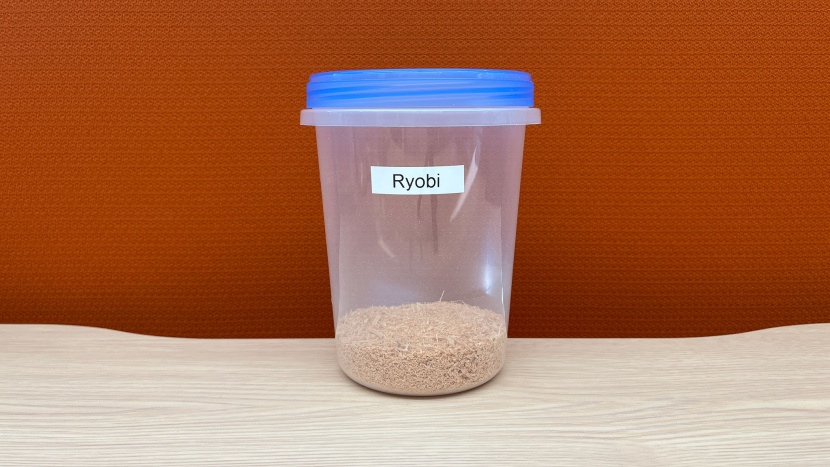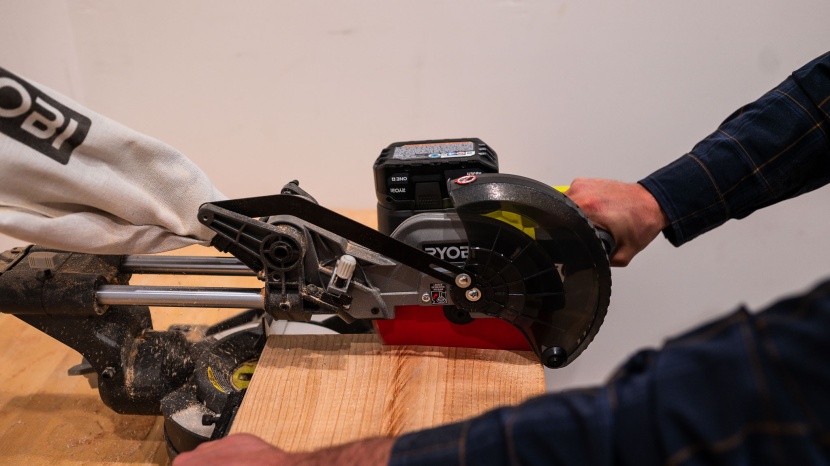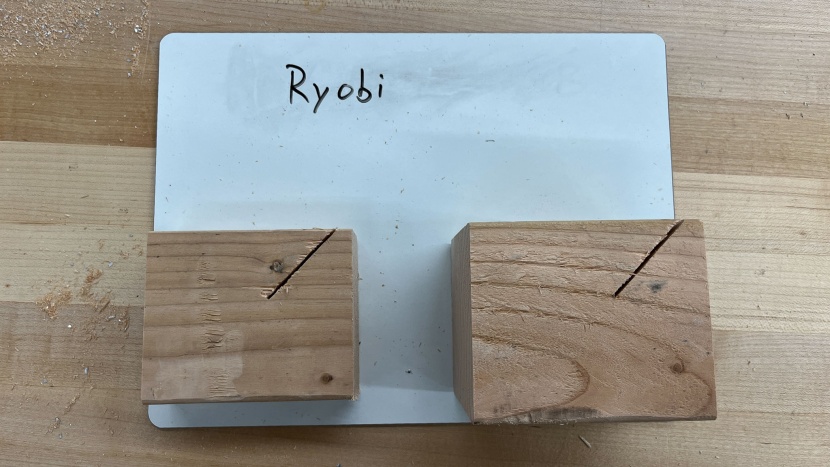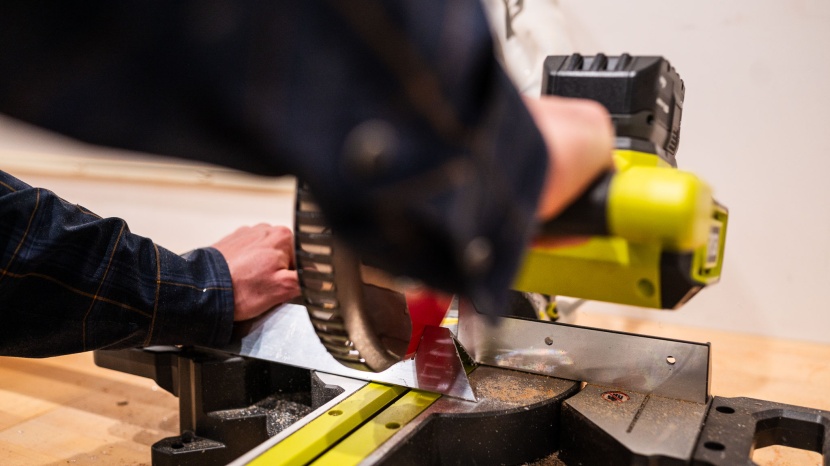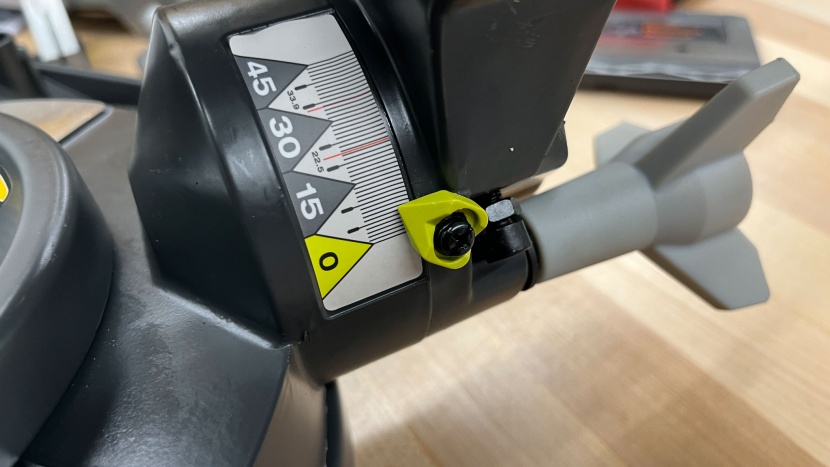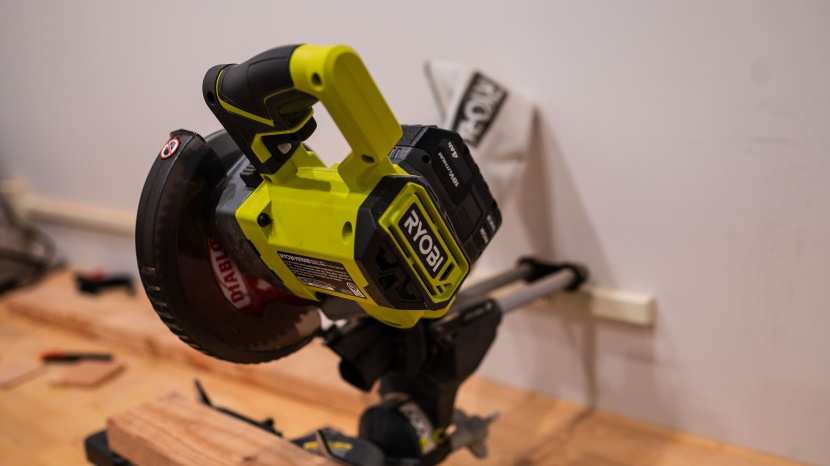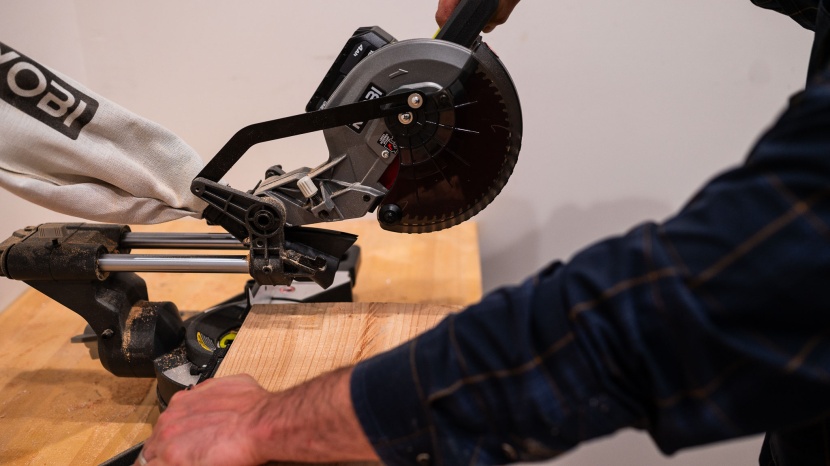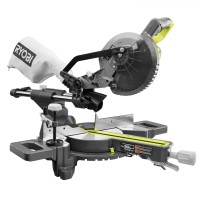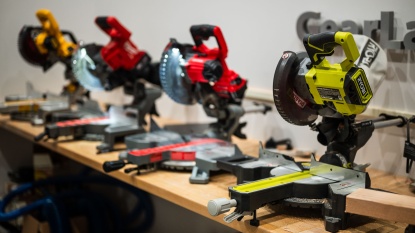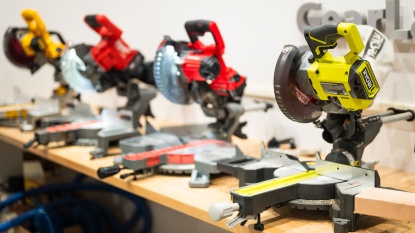
Our Verdict
Our Analysis and Test Results
The Ryobi 18V ONE+ 7-1/4-Inch Single Bevel Sliding Compound distinguishes itself with an impressive cut capacity and the convenience of battery operation. It boasts the ability to execute cross-cuts through 2x10 lumber. Combining its cut capacity, effective dust collection system, and attractive price point, this model is a great value for many DIY enthusiasts.
Ease of Use
Embarking on home improvement projects often requires meticulous planning and considerable time. It's imperative that our tools are intuitive, streamlining the setup, cleanup, and calibration processes. Our test team meticulously calibrated, prepared, and explored the detailed features of the saws, including the blade change system and blade lock depth. The RYOBI enhances the user experience with features like straightforward blade changes, a slide plate for blade depth locking, and simple trigger miter adjustments. However, it does necessitate more calibration compared to other models in our review.
Thankfully, this miter saw is fully adjustable and can be calibrated. Our test team calibrated the saw's fence, blade, miter, and tilt angles. This model required the most calibration, as nearly every plane needed adjustment. The miter angle adjustment proved to be more intricate than that of other models in our review. On a brighter note, the tilt adjustment is straightforward and easy to calibrate.
The blade change process is designed for convenience; the blade guard locks in its highest position to remain unobtrusive. You must remove a bolt that may require considerable force to loosen, but once this is achieved, the rest of the process is seamless.
The blade depth lock is similarly user-friendly, featuring a movable plate that allows for quick adjustments between cuts. It is also equipped with a spring to maintain bolt tension, eliminating the need for additional locking components.
Despite having nine positive stops for tilting at various degrees (45, 31.6, 22.5, 15, 0, 15, 22.5, 31.6, and 45), it lacks a cut line indicator, which can make lining up each cut take a bit more time. Moreover, due to the rail's extension at the back, the saw's footprint remains substantial.
Dust Collection
A great dust collection system will reduce your cleanup time, improve air quality and efficiency. We made 100 cuts on a 2x4 and used a vacuum to collect and weigh how much dust was not collected by the collection system. The Ryobi performs commendably in dust collection, outperforming some lower-end saws while not quite reaching the levels of higher-end models.
Overall, whether using the vacuum or the included dust collection bag, this model's performance was above average. The Ryobi features a rigid dust chute directly behind the saw blade, preventing collapse under powerful vacuum suction—a common problem with other models that use dust collection curtains in front of the port.
When used with a vacuum, leftover sawdust was minimal; after cleanup, we collected just 0.71 ounces of dust, one of the lowest totals in our review.
Cut Capacity
The cut capacity of a miter saw is crucial—it can make or break its suitability for your project requirements. We rigorously tested each saw to determine its ability to handle large lumber pieces for bevel, miter, and cross cuts. The Ryobi boasts one of the largest cut capacities in its class.
The Ryobi adeptly performed cross cuts on a 2x10—showcasing one of the largest cross-cut capacities in its class—and managed miter cuts on a 2x8 with a total miter distance of 9-7/8".
When it came to vertical orientation cuts through the board thickness, the Ryobi delivered average results compared to other battery models. It achieved a vertical cross-cut depth of 3-3/16 inches and a 45-degree bevel-cut depth of 1-29/32 inches on a 4x4.
Cutting Power and Speed
Nothing hampers progress like a saw blade that stalls mid-cut due to insufficient power relative to cutting speed. This can lead to delays and subpar cut quality. Our testing involved cutting through a 2-inch aluminum angle bracket with the point facing upward—challenging the saw by cutting through both sides—and making steady cuts on a 4x4. Additionally, we used a tachometer to measure each product's RPMs; while not factored into our scoring, these readings enriched our understanding of each product's capabilities. The Ryobi offers enough power to cut through most materials. With more challenging materials, the cutting speed needs to be reduced to prevent the blade from stopping.
The Ryobi sailed through the 4x4 without faltering. However, it tended to bog down during rapid consecutive cuts and even stopped occasionally. With no load applied, we recorded an RPM of 3450—slower than most other miter saws in our review.
The saw's lower power was most evident when cutting aluminum; it struggled in our tests and required a slower pace to prevent the blade from stopping.
Precision and Accuracy
Precision is crucial for miter saws designed for swift execution and detailed cutting. To evaluate this aspect, our testing team assessed miter, bevel, and cross-cut accuracy before and after use. The Ryobi offers the expected level of accuracy essential for detail-oriented tasks—assuming proper calibration by the user.
Out-of-the-box adjustments were necessary—the 0-degree cross-cut, miter, and bevel angles all required fine-tuning. The most significant calibration was needed for the bevel angles; it was off by 2.2 degrees at the 0-degree mark and by 3 degrees at 45-degree settings. Subsequent adjustments were within 0.3 degrees of their intended angles. Post-testing showed that the saw generally maintained its calibration with minor deviations ranging from 0.2 to 0.5 degrees—the most significant being a 0.5-degree drift on the 45-degree miter angle.
The Ryobi fence was perfectly square to the table out of the box and is fully adjustable should any misalignment occur over time. While this model provides adequate precision and accuracy for any project type, occasional recalibration checks are advisable due to slight drifts.
Should You Buy the Ryobi 18V ONE+ PBT01B?
If you're searching for a lightweight saw with extensive cut capacity well-suited for most home projects, then the Ryobi 18V ONE+ PBT01B should be on your shortlist. Its affordability and respectable performance in dust collection and cut capacity make it a smart pick for budget-conscious DIYers.
What Other Saws Should You Consider?
For those seeking a battery-powered saw with a cut line indicator and more robust power output, consider exploring options like the Milwaukee M18 FUEL 7-1/4-Inch Dual-Bevel Sliding Compound 2733-20. And if your projects demand even greater power and larger cut capacities, you should consider a corded model like the DeWalt 12-Inch Double-Bevel Sliding Compound DWS780. This saw provided easy cross-cuts through 2x12 lumber and exemplary performance in aluminum cutting tests.
| Awards | Best Budget Battery-Powered Miter Saw |
|---|---|
| Price | $239 List Check Price at Amazon |
Overall Score  |
|
| Star Rating | |
| Bottom Line | This delivers impressive cut capacity and effective dust collection at an affordable price for DIY enthusiasts |
| Pros | Large cross-cut capacity, good dust collection, easy-to-use depth lock mechanism |
| Cons | Requires more calibration, fixed plastic table extentions, no cut line indicator |
| Rating Categories | Ryobi 18V ONE+ 7-1/4... |
| Ease of Use (45%) | |
| Dust Collection (20%) | |
| Cut Capacity (15%) | |
| Cutting Power and Speed (15%) | |
| Precision and Accuracy (5%) | |
| Specifications | Ryobi 18V ONE+ 7-1/4... |
| Cut Line Indicator | None |
| Measured Weight | 22.86 lbs |
| Measured dust collection after 100 cuts | 0.71 oz |
| Max Measured Cut Depth at 90 | 9.9 in |
| Blade Diameter | 7-1/4" |
| Positive Stops Miter | (9) 45º, 31.6º, 22.5º, 15º, 0º, 15º, 22.5º, 31.6º, 45º |
| Positive Stops Bevel / Tilt | (2) 45º, 0º |
| Blade Cut Depth Stop | Yes |
| Sliding | Yes |
| Bevel | Single |
| Miter Angle Range | 47° Left 47° Right |
| Bevel Angle Range | 45° Left |
| Measured RPM | 3450 |
| Average Measured Blade Runout Time | 1.75 seconds |
| Measured Table Width | 15-9/16" |
| Measured Table Width with Extensions | 23-9/16" |


